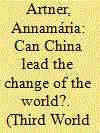| Srl | Item |
| 1 |
ID:
175055


|
|
|
|
|
| Summary/Abstract |
Currently, the world system is in a state of complex crisis and transformation. The overall influence of its US-led centre has weakened, and most of the global periphery is in either chaos or misery. The mechanisms of the global accumulation of capital prevent new global leaders from emerging. Until now, China’s economic ascent has been based on managed market forces and sovereign monetary policy. However, if the liberalisation of capital flows in China continues, the country’s financial independence might be lost. This article explains how the nodal crisis of global capitalism has evolved, how far the marketisation and financial liberalisation of the Chinese economy has gone and the largest obstacles to China further strengthening its influence on the world order. The author concludes that China could play a positive role as a new superpower in constructing a world beyond capitalism, if it does not give up the socialist project, keeps market forces under control, maintains accumulation without dispossession, preserves its financial independence and makes alliances with other nations on the global (semi-)periphery. The latter is particularly important, as the present hegemonic centre will not give up its position peacefully.
|
|
|
|
|
|
|
|
|
|
|
|
|
|
|
|
| 2 |
ID:
192496


|
|
|
|
|
| Summary/Abstract |
This article aims to contribute to the discussion about the ongoing
transformation of the present unipolar, hegemonistic capitalist world
order to a multipolar and fairer global system. The author claims that this
transformation is taking place through the encirclement of the imperialist
center by the developing and emerging countries of the global periphery.
Previous waves of global encirclement are described and the reasons for
its decline in the 20th century are analyzed. The paper also discusses the
role played by China and Russia in the struggle for a multipolar world in
the 21st century. The author argues that only a non-hegemonic multipolar
world order can guarantee nations an independent choice of their path of
socio-economic development and open the way for a socialism-oriented
transformation in all countries.
|
|
|
|
|
|
|
|
|
|
|
|
|
|
|
|